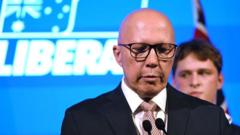In the wake of this stunning electoral blow, calls for a thorough review of the party’s strategy have intensified. Liberal MP Keith Wolahan emphasized the need to “listen to Australians” following the unexpected defeat, acknowledging that “things went wrong.” Dutton’s fall is particularly historic as he becomes the first federal opposition leader in Australia to lose his own seat simultaneously with his party’s overall loss.
Labor’s Ali France emerged victorious on Dutton's home turf in Queensland, further signaling the dissatisfaction within the electorate. Prime Minister Anthony Albanese, celebrating the victory, remarked that “the Australian people voted for unity rather than division,” highlighting the underlying sentiment that appeared to guide voters.
The electoral fallout has left the Liberal Party in a state of disarray, particularly in urban areas like Sydney, Melbourne, Brisbane, and Adelaide, where they have seen a drastic reduction in seats. Former adviser Andrew Carswell described the results as a “complete catastrophe,” citing hesitation towards Dutton, who has been compared to controversial U.S. figures like Donald Trump.
With the spotlight now on the future leadership of the party, names like shadow treasurer Angus Taylor and deputy leader Sussan Ley are emerging as potential successors. However, uncertainty looms over who will take charge as the party attempts to regain the trust of disenchanted voters ahead of the next election.
As the Liberal Party grapples with this significant setback, the next steps they take will be crucial in determining their path forward in Australian politics.
Labor’s Ali France emerged victorious on Dutton's home turf in Queensland, further signaling the dissatisfaction within the electorate. Prime Minister Anthony Albanese, celebrating the victory, remarked that “the Australian people voted for unity rather than division,” highlighting the underlying sentiment that appeared to guide voters.
The electoral fallout has left the Liberal Party in a state of disarray, particularly in urban areas like Sydney, Melbourne, Brisbane, and Adelaide, where they have seen a drastic reduction in seats. Former adviser Andrew Carswell described the results as a “complete catastrophe,” citing hesitation towards Dutton, who has been compared to controversial U.S. figures like Donald Trump.
With the spotlight now on the future leadership of the party, names like shadow treasurer Angus Taylor and deputy leader Sussan Ley are emerging as potential successors. However, uncertainty looms over who will take charge as the party attempts to regain the trust of disenchanted voters ahead of the next election.
As the Liberal Party grapples with this significant setback, the next steps they take will be crucial in determining their path forward in Australian politics.
















